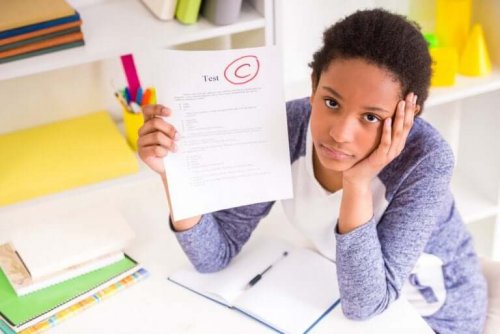Repeating a Grade: How Does It Affect Children?

Has anyone ever suggested that your child should repeat a grade? Repeating a grade usually results in a stain on a student’s file, which can haunt a person for an entire lifetime.
The decision to repeat a school year must be taken by the teachers together with the parents. Nonetheless, since many parents are afraid of this measure, it’s important to analyze several factors, such as how it will affect the child and what the advantages are.
Negative effects of repeating a grade
Repeating a grade can generate negative effects on self-esteem and future job opportunities. By not advancing, children are separated from those, who until then, were their friends. This means having new classmates with whom it may be difficult for them to create friendships with because they might feel like they’re worse than everybody else and have been held back.
From an academic point of view, there won’t always be improvements. It has even been proven that reading comprehension can get worse than before.

Advantages of repeating a school year
If your children need to repeat a grade, it’s because they weren’t able to acquire the necessary knowledge. This knowledge is the basis for learning the teachings of the following grade. Without it, it will be very difficult for them to understand the next courses and they’ll feel lost. Thus, the way to reinforce the content is by repetition.
It’s worth mentioning that passing a child over eight years of age without proper preparation doesn’t only affect the academic aspect. It can also cause displacement because the child isn’t following the subjects at the same level as the other classmates. This may also encourage the child to give up.
Nevertheless, repeating a school year allows you to analyze why the student didn’t learn the teachings. It’s crucial to seek the necessary means to address both academic problems and other issues. If needed, specialized assistance should be used. On the other hand, if the child needs to repeat the year due to an illness or emotional trauma, it may be beneficial.
When is it not convenient to repeat a grade?
The advantages and consequences of repeating a grade aren’t always the same since they depend on the child’s age. Therefore, when the child is very young, the negative repercussions are greater. Making a young child repeat a grade should be the last option.
If possible, you should consider giving the child the opportunity to catch up during vacations. If the problem persists in the following year, it may be more than an academic problem.

What to do if your child repeats a grade
It’s important to keep in mind that, if you agree with the teachers in regard to your child repeating a grade, the learning difficulties will still be present. These don’t disappear on their own and neither will the lack of attention. Hence, it’s vital that you take certain measures to improve the situation and avoid going through it again.
You need to talk with your child’s teachers about support options and services. Additionally, do some research on third-degree retention laws. It’s important to have insight in order to figure out what problems are causing the child to not be able to learn the necessary knowledge.
Involve your children in the decision and never blame them for what happened or make them look like failures. However, if your children are already adolescents and the problem is discipline, you should let them know. Ask them to assume their responsibilities and help them see how it will affect their future. Moreover, look for different ways of motivating them to study.
Find out if there are any factors that affect their academic performance, such as problems at home or peer pressure at school; as well as an illness, a change of address, parents getting a divorce, or the death in the family. Work with your child to overcome the situation in order to prevent it from happening again in the new school year.
In conclusion, repeating a grade may have certain advantages for some children. However, before making such an important decision, it’s best to analyze certain factors. Additionally, it’s necessary to consult a professional specialist in this field, such as a psychopedagogist, and take this option as a last resort.
Has anyone ever suggested that your child should repeat a grade? Repeating a grade usually results in a stain on a student’s file, which can haunt a person for an entire lifetime.
The decision to repeat a school year must be taken by the teachers together with the parents. Nonetheless, since many parents are afraid of this measure, it’s important to analyze several factors, such as how it will affect the child and what the advantages are.
Negative effects of repeating a grade
Repeating a grade can generate negative effects on self-esteem and future job opportunities. By not advancing, children are separated from those, who until then, were their friends. This means having new classmates with whom it may be difficult for them to create friendships with because they might feel like they’re worse than everybody else and have been held back.
From an academic point of view, there won’t always be improvements. It has even been proven that reading comprehension can get worse than before.

Advantages of repeating a school year
If your children need to repeat a grade, it’s because they weren’t able to acquire the necessary knowledge. This knowledge is the basis for learning the teachings of the following grade. Without it, it will be very difficult for them to understand the next courses and they’ll feel lost. Thus, the way to reinforce the content is by repetition.
It’s worth mentioning that passing a child over eight years of age without proper preparation doesn’t only affect the academic aspect. It can also cause displacement because the child isn’t following the subjects at the same level as the other classmates. This may also encourage the child to give up.
Nevertheless, repeating a school year allows you to analyze why the student didn’t learn the teachings. It’s crucial to seek the necessary means to address both academic problems and other issues. If needed, specialized assistance should be used. On the other hand, if the child needs to repeat the year due to an illness or emotional trauma, it may be beneficial.
When is it not convenient to repeat a grade?
The advantages and consequences of repeating a grade aren’t always the same since they depend on the child’s age. Therefore, when the child is very young, the negative repercussions are greater. Making a young child repeat a grade should be the last option.
If possible, you should consider giving the child the opportunity to catch up during vacations. If the problem persists in the following year, it may be more than an academic problem.

What to do if your child repeats a grade
It’s important to keep in mind that, if you agree with the teachers in regard to your child repeating a grade, the learning difficulties will still be present. These don’t disappear on their own and neither will the lack of attention. Hence, it’s vital that you take certain measures to improve the situation and avoid going through it again.
You need to talk with your child’s teachers about support options and services. Additionally, do some research on third-degree retention laws. It’s important to have insight in order to figure out what problems are causing the child to not be able to learn the necessary knowledge.
Involve your children in the decision and never blame them for what happened or make them look like failures. However, if your children are already adolescents and the problem is discipline, you should let them know. Ask them to assume their responsibilities and help them see how it will affect their future. Moreover, look for different ways of motivating them to study.
Find out if there are any factors that affect their academic performance, such as problems at home or peer pressure at school; as well as an illness, a change of address, parents getting a divorce, or the death in the family. Work with your child to overcome the situation in order to prevent it from happening again in the new school year.
In conclusion, repeating a grade may have certain advantages for some children. However, before making such an important decision, it’s best to analyze certain factors. Additionally, it’s necessary to consult a professional specialist in this field, such as a psychopedagogist, and take this option as a last resort.
All cited sources were thoroughly reviewed by our team to ensure their quality, reliability, currency, and validity. The bibliography of this article was considered reliable and of academic or scientific accuracy.
- Carabaña Morales, J. (2015). Repetir hasta 4o de Primaria: determinantes cognitivos y sociales según PIRLS. Revista de La Asociación de Sociología de La Educación ( RASE ), 8(1), 0–4. Retrieved from https://dialnet.unirioja.es/descarga/articulo/4993814.pdf
This text is provided for informational purposes only and does not replace consultation with a professional. If in doubt, consult your specialist.








